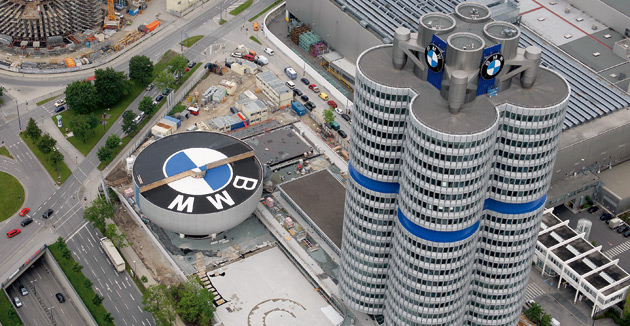Diesel-powered vehicles are facing a tough road ahead as more European cities move to ban older, dirtier, oil-burning cars.
Diesel has long been the preferred fuel of European drivers thanks to its efficiency and lower carbon dioxide levels.
However, mounting research has shown diesel-powered cars spew harmful toxins that may cause cancer and contribute greatly to poor air quality.
DON'T MISS: Netherlands joins Norway in plans to end new gas, diesel car sales by 2025
Now, Bloomberg reports the city of Munich, Germany, may be next to ban older diesel cars—a move that would strike close to home for BMW.
BMW and other German luxury brands count on diesel vehicles to help meet stringent emission standards.
But further action against newer diesels, or a shift in customer preference, may make C02 emission targets for 2020 unachievable.

BMW Munich headquarters
Diesel-powered cars and SUVs accounted for 71 percent of BMW's sales in Europe during the first four months of this year.
That figure, however, has already fallen 4.2 percent from the comparable 2016 figure.
Until this year, most European diesel vehicles are not equipped with the urea-injection exhaust treatment systems found in diesels sold in the United States since 2009 (with the notable exception of some VW models).
READ THIS: How Paris will ban the dirtiest diesels: color-coded stickers
Only newer vehicles have begun receiving the selective catalytic reduction equipment that will allow them to comply with the latest Euro 6b standards.
A BMW spokesperson, unsurprisingly, offered a rebuttal to banning older diesel vehicles.
He argued the ban won't solve long-term issues and reiterated the fuel's importance to meet even more stringent carbon-emission standards coming in 2020.

Volkswagen TDI diesel vehicles owned by Phil Grate and family, Seattle, Washington
“There are better, more intelligent measures like incentives for car sharing and electric mobility that would lead to a sustainable improvement,” said BMW spokesman Glenn Schmidt.
Diesel's popularity has fallen in Europe, but it still accounts for roughly 50 percent of new car sales across the various national markets that make up Europe—a significant portion.
Munich would join four other capital cities across the world to ban diesel vehicles.
CHECK OUT: Mayors of 4 capital cities to ban all diesel vehicles by 2025
Last year, Athens, Madrid, Mexico City, and Paris mayors agreed to ban all diesel vehicles by the year 2025 in order to keep NOx pollutants in check.
In the process, each vowed to do everything possible to promote clean energy vehicles such as hydrogen fuel cells, electric cars, and other alternative propulsion vehicles.
_______________________________________________











